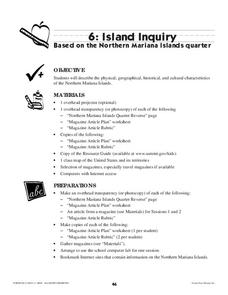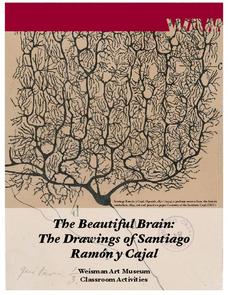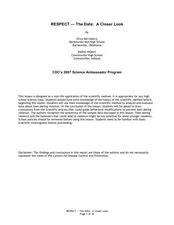Curated OER
Island Inquiry: Based on the Northern Mariana Islands Quarter
Students research two physical and/or human characteristic topics of the Northern Mariana Islands in groups of four students. In this social studies instructional activity, students analyze how to write magazine articles and research the...
Curated OER
The Great Depression: A Study Guide Through Song
Students take a closer look at the political and social outlook during the Great Depression. In this Great Depression lesson plan, students analyze selected songs from the time period. Students use the provided lyric sheets and song...
Curated OER
Steps To An Inquiry Process
Fourth graders investigate the research process. The finding of information about the indian tribes of Montana provides the context for student practice. They identify the problem and generate questions to find answers. The main...
Curated OER
Learning Steps in an Inquiry Process
Third graders are introduced to the steps in the inquiry process. Using this method, they locate and identify at least seven Native American tribes in Montana. In groups, they use the internet to research the culture of the tribes and...
Curated OER
Lesson 1: The Image of Maine in Sinclair Lewis' Babbitt
Pupils study excerpts from Sinclair Lewis, "Babbitt" for its accuracy and socio-economic point of view. They rewrite a portion of "Babbit" using the point of view of a Maine guide.
California Academy of Science
What Would Happen?
Nothing says classroom fun like an invertebrate and a magnifying glass! Snails, earthworms, and roly-poly bugs become the center of attention as pint-sized investigators hone their inquiry and observation skills. They are guided through...
NOAA
Biological Oceanographic Investigations – Through Robot Eyes
How can a robot measure the length of something when we don't know how far the camera is from the object? The lesson explains the concept of perspective and many others. Scholars apply this knowledge to judge the length of fish and the...
Curated OER
Historical Agency in History Book Sets (HBS)
Study historical events by combining the study of historical fiction and non-fiction. Learners read about true past events in historical fiction novels and then research non-fiction accounts of the same events. What are some differences...
Curated OER
Simple Machines IV - Levers
The lever is an everyday simple machine. Youngsters learn the principles of levers and explore their many uses. Groups of pupils perform a simple lab where they lift objects with a fulcrum while placing the load in a variety of...
Curated OER
Tobacco: Promotion Tactics and the Law
Youths aged 13 & 14 are most likely to notice and remember in-store tobacco promotions. Class members dissect tobacco advertising tactics and learn about relevant legislation by participating in guided discussion. Assessing...
University of Minnesota
Beautiful Brain: Do You See What I See?
Can art play tricks on your eyes, and can a still painting really appear to vibrate? The second instructional activity in a four-part series discusses the way our beautiful brains translate visual images. It highlights the style of...
University of Minnesota
Beautiful Brain: Step Inside the Brain
Before digital microscopes, scientists hired artists to draw the things visible in the microscope. Through training in neuroscience and art, Cajal revolutionized the way we view the beautiful brain. The third lesson in a series of four...
University of Minnesota
Beautiful Brain: Brain Inspiration
"Neuroscientists consider Cajal as important to their discipline as Einstein is to physics." The first of four lessons has scholars view Santiago Ramon y Cajal's drawings of neurons. They reflect and respond to the art through writing...
University of Minnesota
Beautiful Brain: Strangest Dream
Do words change or add meaning or interest to a work of art? The final lesson in a four-part series on the beautiful brain as a work of art focuses on art analysis. Scholars write a story about exploring art from the inside. Reflections...
Curated OER
Ocean Life
Mini-marine biologists use Scholastic Explorers website to learn about declining numbers of leatherback sea turtles and dusky dolphins. They fill out a K-W-L chart and observation journal worksheet, which are both provided in the lesson...
Curated OER
Recyclers to the Rescue
Producers, consumers, food chains, and plants are the stars of this science lesson. Learners take part in an inquiry which helps them to discover the most effective and efficient way to grow a producer. They have a variety of containers...
California Academy of Science
Notice and Wonder
Pint-sized zoologists practice the art of observation. They take notes, pictures or written, as they observe an animal for a period of time. This can be done at the zoo, with a visiting classroom animal, or perhaps at the humane society....
American Chemical Society
Development of Baking Powder
Did you know baking powder can be used to treat acne, whiten teeth, and make sugar cookies? The lesson plan on the development of baking powder is ready-to-go with no preparation required. Through readings, pupils answer questions,...
Curated OER
F = ma, Inertia, and Action-Reaction
Fourth graders apply concepts of Newton's Laws in scientific inquiries. Use this instructional activity to have your charges test and identify the characteristics of objects that make them easier or harder to push. After a teacher-led...
University of Minnesota
Dendritic Spines Lab
This is your brain on drugs ... literally! Your neuroscientists-in-training examine the evidence of drug use on the human brain and how neurons change their connectivity when altered by drugs. They then work together to create testing...
Learning for Justice
Mary McLeod Bethune
Young historians conduct a close reading of the text of an interview with Mary McLeod Bethune, the daughter of former slaves who taught herself to read, grew up to establish schools for other Black women, and went on to become an advisor...
Curated OER
How to Build an Electric Motor
Sixth graders build a working motor. In this lesson on motors, 6th graders use an inquiry method of learning to discover how to create a working electric motor with the supplies given to them. The teacher will guide them as needed....
Curated OER
Respect--The Data: A Closer Look
Students explore the steps in the scientific method process. For this science lesson, students identify warning signs that someone is in an abusive dating relationship. They evaluate the credibility of information sources.
Curated OER
Eating the Food Pyramid
Students explore the concept of the Food Guide Pyramid. For this nutrition lesson, students discuss healthy eating habits after reading the book entitled Gregory, the Terrible Eater. Students then work in groups finding pictures of the...

























